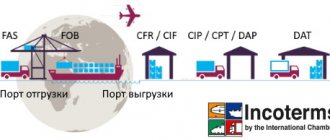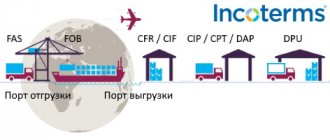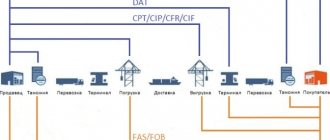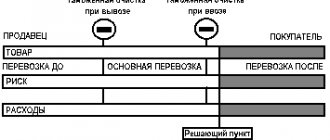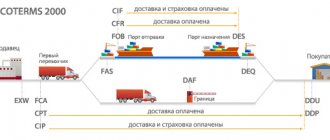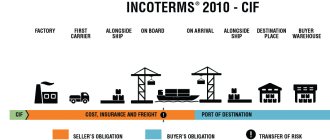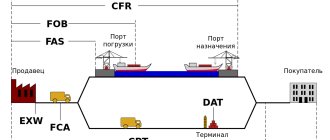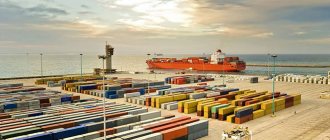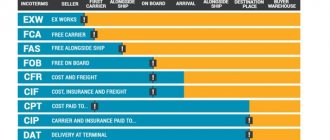FOB (English FOB, Free On Board, “free on board”, “free on board”) - a variant of delivery terms in accordance with international Incoterms rules, which assumes that responsibility for the goods and the risks of damage to them pass from the seller to the buyer in the moment when the item is on board the ship (after loading).
Contract price and what is the delivery basis?
In international trade, when concluding contracts, it is usually clearly stated who will bear certain costs and, accordingly, what the price of the goods will be. Thus, the contract price is the price fixed in the purchase and sale document (contract). The very distribution of responsibilities of the parties for insurance and payment of transportation costs, determination of the moments of transfer of risks and property rights from the seller to the buyer is called the delivery basis .
Buyer's responsibilities
The buyer is the party receiving the cargo. He has few responsibilities. It is necessary to select the required side of the vessel for loading the goods and inform the seller about your choice. Make payment under the purchase and sale agreement. If the buyer has the right to set the date and place of receipt of the goods, he is obliged to notify the seller about this.
There are ports where the buyer is responsible for loading cargo on board. This happens extremely rarely. Registration of licenses, certificates and other customs formalities are solely the responsibility of the buyer. The cost of inspection of the cargo by the authorities is paid by the buyer.
It is necessary to understand that both parties bear responsibility for the safety of the cargo. The seller is responsible for the goods until they are loaded on board. The buyer is responsible for everything that happens to the cargo from the moment it is loaded on board. The rights to the transported cargo pass from the seller to the buyer along with responsibility.
Basic delivery terms CIF and FOB: differences in the responsibilities of the parties
What are fob delivery terms or cif delivery terms? It would seem that clearly state in the contract who is responsible for what and until when - and there will be no problems. But no! The main problem is the completely different, sometimes even opposite, interpretation of some trade terms by the legislation of individual countries. This leads to misunderstandings, disagreements, disputes, loss of time and money, and litigation. In order for terms and conditions to be interpreted equally and problems of unambiguous interpretation to arise as rarely as possible, the International Chamber of Commerce (International Chamber of Commerce - The World Business Organization https://www.iccwbo.org) developed and published uniform standardized rules - Incoterms (international commercial terms), also called basic terms of delivery - Basis terms of delivery. They make it possible to simplify the wording as much as possible when concluding a purchase and sale agreement, clearly indicate the obligations assumed by the parties, and greatly facilitate the choice of transport conditions . If you have expensive cargo or it needs to be delivered to several customs offices, then in Russia the simplest and least expensive option is to hire a customs carrier .
The purpose of Incoterms is to clearly regulate the following issues:
- Which party is responsible for providing the means of transport to ship the goods?
- Which party bears the costs of customs clearance, certification and licensing of imported/exported goods.
- The exact place, and sometimes even the position of the goods, where the seller’s transportation costs end and the buyer’s begin.
- The point at which the risk of damage or loss of cargo passes from the seller to the buyer.
- The point in time before which the seller must fulfill his obligations and transfer the goods to the buyer (or transport company). In other words, delivery times.
In the new edition of Incoterms, the obligations of the parties are grouped into 13 sections. Below we will briefly describe each of the sections, but now let's look at these responsibilities using the example of the two most popular terms - FOB and CIF. For us, these conditions are also close in that they relate exclusively to sea cargo transportation.
Disadvantages of Free On Board
This method of transporting goods also has disadvantages. Among them it is worth highlighting the following:
- The method of cargo transportation by sea is problematic to organize. You will have to completely trust the seller and rely on his word of honor.
- All documentation will have to be provided remotely.
- Transportation by water takes longer than air travel or delivery by rail.
Based on the above qualities, we can say that this method of cargo transportation is reliable if you cooperate with bona fide, trusted sellers. If you have difficulties in organizing the transportation process, then Fialan is ready to help with this. Offer a full range of services from finding a seller to delivering goods to a buyer in Russia. Call!
FOB delivery terms
When concluding a contract on FOB terms , the seller is obliged to organize and pay for the delivery of the cargo to the port of shipment and its loading onto the ship chosen by the buyer . When exported , he also carries out customs clearance of the goods. Risks associated with damage or loss of goods are transferred to the buyer at the moment the cargo crosses the side of the ship at the port of loading . The conditions FOB STOWED (FOB with placement) and FOB STOWED AND TRIMMED (FOB with placement and trimming) are used in sales contracts to clarify the seller’s obligation to stow and correctly distribute the goods loaded on the ship in the hold. The second option is used exclusively for bulk cargo. When adding such terms to a purchase agreement, it is necessary to clarify who bears the costs of these additional responsibilities and at what point the risk passes to the buyer in order to clearly define the FOB price.
FOB in different versions of Incoterms
These conditions of transportation were outlined in the very first edition of the Incoterms rules - from 1936. Later, in 1976, a special FOB Airport (aka FOA) basis was introduced, which was developed specifically for transportation by aircraft, but already in 1980. the FOA basis was replaced by the more universal FRC (Free Carrier, now FCA).
The classic FOB basis (for water vessels) remains valid in the current edition of the rules (Incoterms 2020).
FOB delivery terms are in many ways similar to FAS and FCA bases.
CIF delivery terms
According to the CIF , the terms of delivery impose responsibility on the seller for delivery of the cargo to the port of destination , its insurance, export customs clearance, loading on the ship chosen by the seller and the freight of this ship. Although the seller pays for all of the above, his delivery obligations are considered fulfilled after the goods are loaded onto the ship at the port of departure. Accordingly, risk transfer also occurs there.
Thus, the main difference CIF and FOB delivery terms is the transport component : who chooses the carrier and pays transport costs - the seller or the buyer. CIF and FOB prices depends on the transport component .
Without going into details, CIF means the seller pays for transport; if FOB , the buyer pays for transport. The difference between the CIF and the FOB is equal to the cost of delivery to the destination port.
Responsibilities of the sender
The seller of the goods acts as the sender of the goods. According to the terms of Free On Board, which are agreed upon by both parties, the sender is obliged to deliver the necessary goods to the port and organize its loading on board. As a rule, the vessel for loading is determined by the customer, but such authority is sometimes vested in the buyer.
In fact, after loading, the sender no longer bears responsibility for the goods. This is logical, because he did not choose the ship and is not present nearby during transportation. However, he is responsible for the costs associated with bringing the cargo on board. The sender is obliged to properly notify the buyer about the date and place of receipt of the goods.
Transport conditions and commercial risks
It should be noted that Incoterms govern the relations of the parties exclusively within the framework of the purchase and sale agreement. Therefore, the transportation contract should be concluded separately, and it should already stipulate all the transport conditions . For sea transportation, this section of the sales contract stipulates:
- port of loading and unloading of goods;
- point of transfer or transshipment of cargo;
- type of charter or bill of lading;
- the procedure for informing the parties about the vessel’s arrival at the port and its readiness for loading and unloading operations;
- procedure for determining lay time;
- loading and unloading standards;
- conditions and procedure for paying fines (demurrage and dispatch) to the carrier.
Incoterms also do not stipulate who assumes the commercial risks for possible maritime surcharges. For example, BAF (fuel surcharge), ERS (contingency transport charges) or CAF (currency surcharge). Commercial risks may also include sudden increases in port or insurance rates, increases in wages or carrier tariffs. Unfortunately, there are many such “pitfalls” hidden in Incoterms.
All these risks can be additionally reinsured. However, in this case, insurance costs will increase.
Advantage of Free On Board
What are the benefits of FOB Incoterms transportation and what are its special advantages:
- FOB is used exclusively for transporting goods by water, so it will not be confused with other types of cargo transportation.
- Water modes of transport are used as means of transportation.
- Responsibilities are clearly distributed between the buyer and sellers. This eliminates confusion. Everyone knows what they should do, when and what to pay, what documents to provide to each other.
- All FOB conditions ensure the safety of cargo transportation.
- Many buyers use the FOB service. It is quite common and reliable.
Distribution of costs and risks between the carrier and the cargo owner
One of the biggest risks for contracting parties is the choice of delivery terms. Specifically, who, when and how much will pay for transportation.
It should be recalled here that contracts are most often concluded long before the cargo is sent. And at the time of shipment, the transportation price may differ significantly from that specified in the contract. The carrier himself also takes risks by stipulating the cost of his services long before the start of transportation.
Ideally, the amount of freight due to the carrier should cover all future expenses (fuel, crew salaries, loading and unloading, repairs and maintenance of the vessel, port duties) and the risks of the carrier. However, in a competitive environment, the carrier has to indicate a deliberately lower price. Thus, the freight amount may not reimburse the shipowner for all costs.
What obligations do the parties have under the terms of FOB Incoterms 2010
General responsibilities. If you are a seller,
then you are responsible for providing the goods to the Buyer on time with the necessary commercial and accompanying documentation.
If you are a buyer
– timely payment for the purchased goods is required.
Permits.
If you are a seller
, you must provide export clearance for the goods at your own expense, as well as within the period stipulated by the delivery time of the goods. All necessary documentation and other possible formalities that are necessary for export clearance of cargo are assigned solely to you. If they are handled by a third party, then this relationship will not in any way affect your obligations to the Buyer.
If you are a buyer,
then you bear the costs and responsibilities associated with the process of customs clearance of cargo in the country of import, as well as in the country of transit, if they are implied according to the route of international multimodal transportation.
Transportation and insurance contracts
.
If you are a seller
, you are not responsible to the Buyer for choosing a shipping agent and do not insure the cargo. In practice, the Seller often uses the services of the same agent from whom the Buyer orders sea transportation. Such a scheme has a right to exist if the amount of agency fees and payments suits all participants in the transaction. Otherwise, you can contact another agent.
If you are a buyer,
then you need to conclude an agreement with payment for further transportation of goods. You have no obligation to the Seller to select a shipping line or agent. You are not obligated to provide additional cargo insurance. When clearing cargo in the import country, you are required to show the customs authorities a document that confirms the cost of transportation to the customs border of the import country.
Typically, such a document is a contract with a shipping agent and a certificate of invoice. The terms of FOB delivery and unloading in the customs territory of the Russian Federation suggest that it is enough to show only the payment of freight. Port forwarding, unloading and other manipulations with cargo at the port of import are not included in the customs value and do not constitute the basis for calculating customs duties.
Delivery of goods (for the seller), acceptance of delivery (for the buyer).
If you are a seller
, you must deliver the goods on board the vessel at the specified time - therefore, transfer the cargo to the disposal of the Buyer.
In this situation, the Carrier is either the shipping line itself, or a shipping agent/logistics company that buys from the line and then resells these services to end consumers. If you are the buyer,
you must accept delivery. Acceptance of goods is nominal. As a rule, agents exchange documents.
- Risks of export and import. How to manage them?
It is important!
Do not assume that towing a container directly from the shipping line will be cheaper compared to an agent.
Shipping companies provide wholesale discounts for agents, which individual container shipping customers cannot count on. Moreover, shipping lines do not bother themselves with services or further freight forwarding; the agent can provide the entire delivery from the container on board the ship to the final destination. It is important for the buyer to obtain a bill of lading document, which is needed to pick up the cargo at the port of destination. The data that must be displayed on the bill of lading is agreed upon with the Buyer, which should be mentioned within the framework of the international agreement.
The bill of lading can be either telex (EDI) or original. Typically, the bill of lading is issued by the agent and handed over to the Seller after he has paid all shipping and handling charges. The Seller then sends the bills of lading to the Seller with the original commercial documents. When the procedure is delayed, the Buyer and Seller give orders for a telex release, saving courier costs and time.
